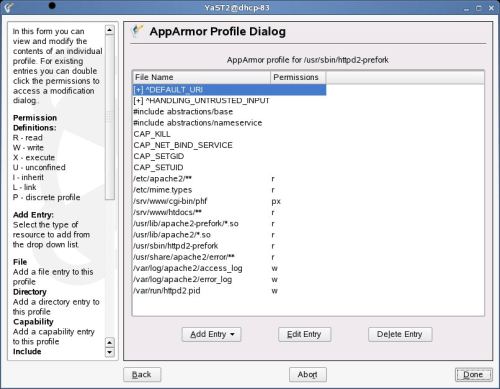AppArmor is an access control system that lets you specify per program which files the program may read, write, and execute. AppArmor secures applications by enforcing good application behavior without relying on attack signatures, so it can prevent attacks even if they are exploiting previously unknown vulnerabilities.
AppArmor is a Linux Security Module implementation of name-based access controls. AppArmor confines individual programs to a set of listed files and posix 1003.1e draft capabilities.
AppArmor protects your infrastructure from attackers who find and exploit application flaws by helping you rapidly develop and enforce security policies. These policies could, for example, define the scope of an application’s access to system resources or enforce beneficial application behavior. AppArmor gives you the tools to protect your critical infrastructure without huge investments in time, resources or training.
AppArmor protects systems from insecure or untrusted processes by running them in confinement, still allowing them to share files with other parts of the system, exercising privilege, and communicating with other processes, but with some restrictions. These restrictions are mandatory; they are not bound to identity, group membership, or object ownership. In particular, the restrictions also apply to processes running with superuser privileges. AppArmor achieves this by plugging into the Linux Security Module (LSM) framework. The protections provided are in addition to the kernel’s regular access control mechanisms.
Features include:
- Easy to use.
- Full integration.
- Easy deployment – it includes a full integrated suite of tools to help you develop, deploy and maintain application security policies.
- Auditable policies.
- Protects the operating system, custom and third-party applications from both external and internal threats by enforcing appropriate application behavior.
- Reporting and alerting. Built-in features allow users to schedule detailed event reports and configure alerts based on user-defined events.
- Sub-process confinement.
Website: gitlab.com/apparmor/apparmor
Support:
Developer: AppArmor Team
License: GNU General Public License v2.0

AppArmor is written in Python, C and C++. Learn Python with our recommended free books and free tutorials. Learn C with our recommended free books and free tutorials. Learn C++ with our recommended free books and free tutorials.
| Popular series | |
|---|---|
| The largest compilation of the best free and open source software in the universe. Each article is supplied with a legendary ratings chart helping you to make informed decisions. | |
| Hundreds of in-depth reviews offering our unbiased and expert opinion on software. We offer helpful and impartial information. | |
| The Big List of Active Linux Distros is a large compilation of actively developed Linux distributions. | |
| Replace proprietary software with open source alternatives: Google, Microsoft, Apple, Adobe, IBM, Autodesk, Oracle, Atlassian, Corel, Cisco, Intuit, SAS, Progress, Salesforce, and Citrix | |
| Awesome Free Linux Games Tools showcases a series of tools that making gaming on Linux a more pleasurable experience. This is a new series. | |
| Machine Learning explores practical applications of machine learning and deep learning from a Linux perspective. We've written reviews of more than 40 self-hosted apps. All are free and open source. | |
| New to Linux? Read our Linux for Starters series. We start right at the basics and teach you everything you need to know to get started with Linux. | |
| Alternatives to popular CLI tools showcases essential tools that are modern replacements for core Linux utilities. | |
| Essential Linux system tools focuses on small, indispensable utilities, useful for system administrators as well as regular users. | |
| Linux utilities to maximise your productivity. Small, indispensable tools, useful for anyone running a Linux machine. | |
| Surveys popular streaming services from a Linux perspective: Amazon Music Unlimited, Myuzi, Spotify, Deezer, Tidal. | |
| Saving Money with Linux looks at how you can reduce your energy bills running Linux. | |
| Home computers became commonplace in the 1980s. Emulate home computers including the Commodore 64, Amiga, Atari ST, ZX81, Amstrad CPC, and ZX Spectrum. | |
| Now and Then examines how promising open source software fared over the years. It can be a bumpy ride. | |
| Linux at Home looks at a range of home activities where Linux can play its part, making the most of our time at home, keeping active and engaged. | |
| Linux Candy reveals the lighter side of Linux. Have some fun and escape from the daily drudgery. | |
| Getting Started with Docker helps you master Docker, a set of platform as a service products that delivers software in packages called containers. | |
| Best Free Android Apps. We showcase free Android apps that are definitely worth downloading. There's a strict eligibility criteria for inclusion in this series. | |
| These best free books accelerate your learning of every programming language. Learn a new language today! | |
| These free tutorials offer the perfect tonic to our free programming books series. | |
| Linux Around The World showcases usergroups that are relevant to Linux enthusiasts. Great ways to meet up with fellow enthusiasts. | |
| Stars and Stripes is an occasional series looking at the impact of Linux in the USA. | |